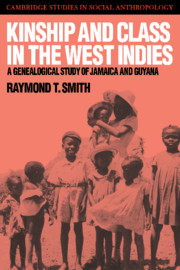Book contents
- Frontmatter
- Contents
- Preface
- Maps
- 1 Introduction: assumptions, procedures, methods
- 2 Kinship, culture and theory
- 3 What is kinship in the West Indies?
- 4 The structure of genealogies
- 5 Marriage in the formation of west Indian society
- 6 Modern marriage and other arrangements
- 7 Sex role differentiation
- 8 Household and family
- 9 Conclusion
- References
- Index
- Cambridge Studies in Social Anthropology
4 - The structure of genealogies
Published online by Cambridge University Press: 29 October 2009
- Frontmatter
- Contents
- Preface
- Maps
- 1 Introduction: assumptions, procedures, methods
- 2 Kinship, culture and theory
- 3 What is kinship in the West Indies?
- 4 The structure of genealogies
- 5 Marriage in the formation of west Indian society
- 6 Modern marriage and other arrangements
- 7 Sex role differentiation
- 8 Household and family
- 9 Conclusion
- References
- Index
- Cambridge Studies in Social Anthropology
Summary
The genealogical method makes it possible to investigate abstract problems on a purely concrete basis. It is even possible by its means to formulate laws regulating the lives of people which they have probably never formulated themselves, certainly not with the clearness and definiteness which they have in the mind trained by a more complex civilization.
W.H.R. Rivers 1914Writers on the Caribbean are preoccupied with disorganization, the destructive effects of slavery, plantation agriculture, poverty, or with the supposed moral degeneration among peoples who have been cut off from their ‘homelands’ and ancestral cultures. These themes are part of the fabric of West Indian life; firmly lodged in the minds of poets, novelists, academics, and ordinary men and women. At the same time, the texture of everyday life in the Caribbean is neither individualistic nor anomic. Individuals are enmeshed in complex and ramifying networks of kinsmen, friends and neighbours. When West Indians migrate to Britain or the United States or Canada they settle in enclaves which are not West Indian, but more specifically Jamaican, Barbadian, Guyanese, Puerto Rican, Cuban, or Haitian. Letters, money, numerous gifts and visits flow back and forth along the lines of previous connection. In the West Indies, rituals marking the individual's passage through life – baptism or its equivalent, marriage and funerals – are impressively elaborate and well attended compared to the almost furtive ceremonies of urban dwellers in the more developed societies.
- Type
- Chapter
- Information
- Kinship and Class in the West IndiesA Genealogical Study of Jamaica and Guyana, pp. 47 - 81Publisher: Cambridge University PressPrint publication year: 1988



